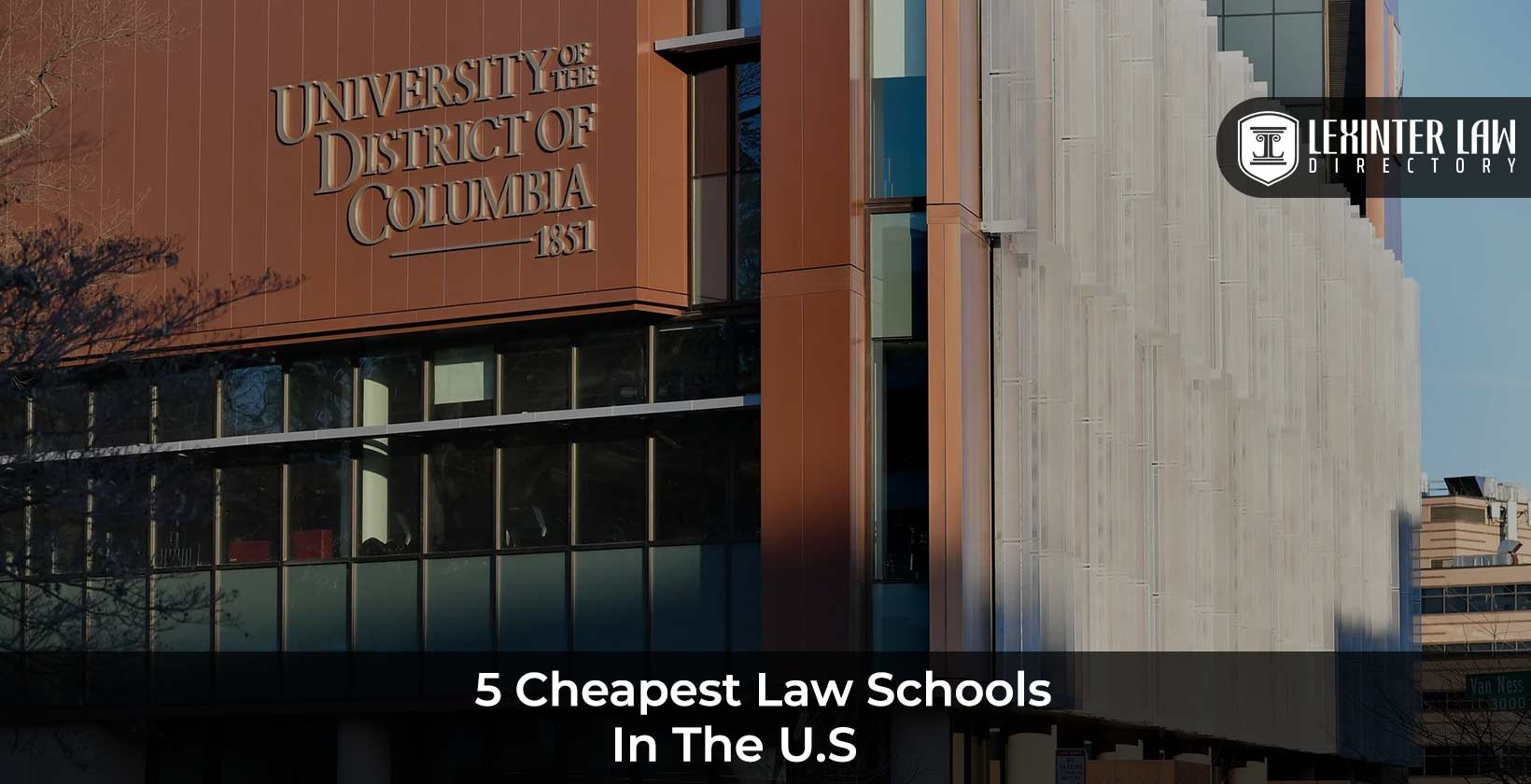5 Cheapest Law Schools In The U.S
The 5 cheapest law schools in the U.S., including the University of the District of Columbia (Clarke), Brigham Young University (Clark), the University of Arkansas-Little Rock (Bowen), the University of Montana (Blewett), and Georgia State University, provide accessible paths to legal education with minimized financial strain. The cheapest law schools to get into allow students to pursue law careers without overwhelming debt, which is especially advantageous for individuals interested in public service or community-based law. The institutions balance affordability with quality education, equipping students with the skills necessary to serve their communities. Choosing the cheapest law schools in the U.S. allows students to gain a quality legal education without overwhelming debt. Several affordable law schools emphasize practical training through clinics, externships, and public service opportunities, preparing students for successful legal careers. Graduates benefit from strong job placement programs and local networks supporting career growth in private and public sectors. Specialized programs in high-demand fields like environmental law, health law, and public interest law further enhance graduates’ skills. The affordable institutions provide accessible, sustainable pathways for students to make an impact in their communities.
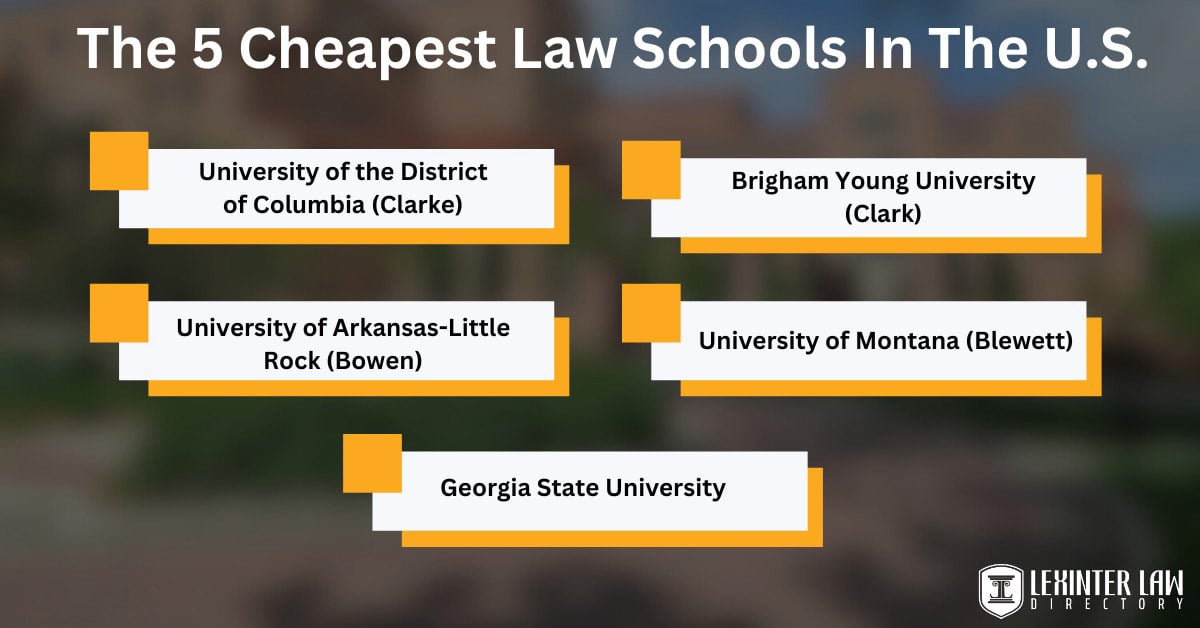
The 5 cheapest law schools in the U.S. are listed below.
- University of the District of Columbia (Clarke): The University of the District of Columbia David A. Clarke School of Law is known for its affordability, with annual tuition at $13,438 for residents and $25,874 for non-residents. UDC Law emphasizes public interest and community-based legal education, offering extensive clinical programs in fields like immigration and civil rights. The school’s accessible tuition structure supports students pursuing careers in lower-paying legal sectors.
- Brigham Young University (Clark): Brigham Young University J. Reuben Clark Law School charges annual tuition of approximately $15,076 for members of the Church of Jesus Christ of Latter-day Saints and $30,152 for non-members. BYU Law combines affordability with high Bar passage rates and strong job placement, providing graduates with competitive career opportunities. The school emphasizes ethical training and leadership, attracting students interested in corporate law and public service.
- University of Arkansas-Little Rock (Bowen): The University of Arkansas at Little Rock William H. Bowen School of Law offers affordable tuition, with in-state rates of around $16,728 and out-of-state tuition at $32,671 annually. Bowen Law supports students with robust financial aid and emphasizes practical training through clinics and externships. The law school’s location in the state capital provides unique governmental and public interest law opportunities for graduates interested in serving the community.
- University of Montana (Blewett): The Alexander Blewett III School of Law offers an affordable annual tuition of $22,060 for Montana residents and $47,794 for non-residents. Blewett Law, with its emphasis on environmental and natural resources law, provides students with experiential learning in areas relevant to Montana’s industries. The affordable tuition attracts students interested in environmental protection, public service, and rural law practices.
- Georgia State University: Georgia State University College of Law has an annual tuition of approximately $17,596 for Georgia residents and $37,144 for non-residents. Georgia State Law, situated in downtown Atlanta, offers extensive opportunities in business law, health law, and public interest. The affordable tuition and strong local job placements make Georgia State popular for students aiming to practice in the Atlanta area or pursue public sector careers.
Table of Contents
- 1. University Of The District Of Columbia (Clarke)
- 2. Brigham Young University (Clark)
- 3. University Of Arkansas-Little Rock (Bowen)
- 4. University Of Montana (Blewett)
- 5. Georgia State University
- How To Choose Which Cheap Law School To Apply For?
- What Are The Benefits Of Getting Into A Cheap Law School?
- What Are The Downsides Of Getting Into A Cheap Law School?
1. University Of The District Of Columbia (Clarke)
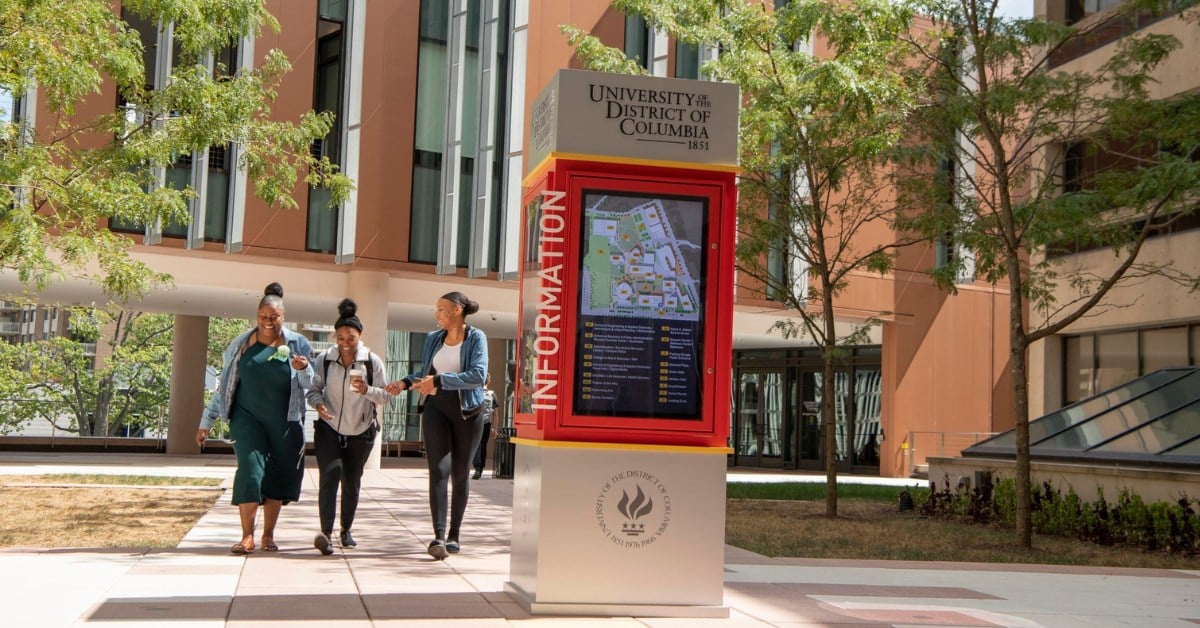
The University of the District of Columbia David A. Clarke School of Law (UDC Law) offers an affordable, ABA-accredited education with a strong focus on public interest law. UDC Law aims to provide legal training geared towards social justice and community service careers, positioning itself as a distinctive choice for aspiring lawyers passionate about public service. The law school provides one of the lowest tuition rates among ABA-accredited law schools, making it highly affordable. Tuition is $13,438 for D.C. residents and $25,874 for non-residents. The cost-effective approach enables students to pursue a legal education without incurring heavy debt, appealing to individuals seeking a financially accessible path to a law degree.
UDC Law ranks between 178 and 196 in U.S. law schools, according to the U.S. News & World Report, focusing on public interest law over corporate placements. The law school’s high ranking in clinical training, where it stands sixth nationwide, reflects a commitment to experiential learning and hands-on practice. The University of the District of Columbia is fully accredited by the American Bar Association, meeting all necessary standards for students to take the Bar exam and pursue professional practice. ABA accreditation ensures UDC Law’s curriculum upholds national standards, making it a recognized and reputable institution in the legal education field.
UDC Law was established in 1986 following the closure of Antioch School of Law, continuing its mission of accessible legal education with a public interest focus. The law school emphasizes social justice and community service, making it ideal for students driven by the values founded on Antioch’s commitment to affordability. UDC Law, situated in Washington, D.C., is just five miles from the National Mall, offering proximity to numerous government offices, public interest organizations, and nonprofit agencies. The location enables students to gain practical experience while accessing numerous public transportation options, making the school conveniently accessible.
UDC Law’s acceptance rate stands at around 44.3%, making it more accessible than many other law schools. A higher acceptance rate reflects the school’s mission to provide affordable legal education, particularly for students underrepresented in the legal profession in Washington, D.C. UDC Law’s median LSAT score for admitted students is approximately 151, with scores generally ranging from 147 to 153. The score range allows for accessibility, aligning with the school’s mission to offer legal education to a broader student base. Admitted students at UDC Law hold a median GPA of 3.27, with the middle 50% ranging from 2.92 to 3.55. The GPA requirement aligns with the school’s dedication to serving students from diverse academic backgrounds and life experiences. The University of the District of Columbia does not accept GRE scores for admission, focusing solely on LSAT scores. Admissions prioritize applicants’ commitment to public service, resonating with UDC Law’s mission to advance social justice and public interest law. UDC Law’s Bar exam passage rate for first-time takers is approximately 47.9%, below the national average. The passage rate is a crucial factor for prospective students interested in private-sector roles where Bar passage remains essential.
UDC Law offers a primary Juris Doctor (JD) program, available in full-time and part-time formats. Flexible scheduling supports students in balancing other responsibilities, making UDC Law accessible to nontraditional students. The law school’s specialized clinics emphasize public interest and social justice, covering areas like Criminal Law, Immigration, and Community Development. Hands-on experience through the clinics strengthens practical skills and aligns with the school’s mission-driven education model.UDC Law’s tuition remains one of the most affordable among ABA-accredited law schools in the U.S. Tuition for D.C. residents is $13,438, while non-residents pay $25,874 annually. Affordability positions UDC Law as a valuable option for students to minimize debt while pursuing public service.
2. Brigham Young University (Clark)
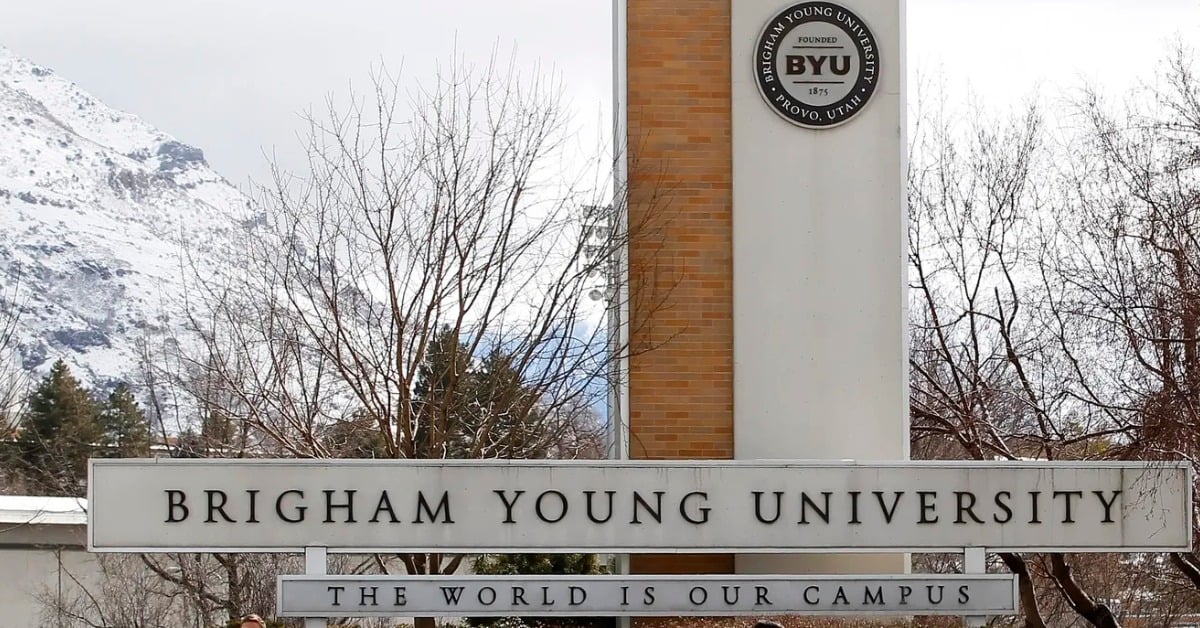
The J. Reuben Clark Law School at Brigham Young University (BYU Law) provides an ABA-accredited, values-based legal education in Provo, Utah. BYU Law, recognized for its high academic standards and emphasis on ethics and leadership, offers rigorous legal training aligned with the values of The Church of Jesus Christ of Latter-day Saints.
The law school is among the most affordable law schools, with tuition at $15,076 for LDS members and $30,152 for non-members. Scholarships and grants, covering up to 50% of tuition, make BYU Law a financially accessible option, especially considering its academic ranking and reputation.
Brigham Young University ranks as the nation’s best-value law school according to The National Jurist and holds the 28th position in the U.S. News & World Report. High value and low tuition costs make BYU Law attractive for students seeking affordable quality education. The American Bar Association fully accredits BYU Law and meets high educational standards as an AALS member. ABA accreditation qualifies JD graduates to sit for the Bar in any U.S. jurisdiction, ensuring national recognition of BYU Law’s degree program.
BYU Law, founded in 1973 and named for LDS leader J. Reuben Clark, emphasizes legal education with ethical and values-based foundations. The school’s commitment to leadership and service aligns with its religious affiliation, making it a distinctive choice for motivated students. Brigham Young University, located in Provo, Utah, offers a vibrant campus near the Wasatch Mountains, providing access to outdoor recreation and the dynamic local business community. Provo’s growing tech and business sectors create valuable networking and career-building opportunities for law students.
BYU Law’s acceptance rate is approximately 28.77%, reflecting competitive admissions and the high academic standards upheld by the school. Selective admission aligns with the institution’s commitment to cultivating capable, dedicated students in a rigorous academic environment. BYU Law’s median LSAT score for admitted students is 168, with scores ranging from 162 to 170. The high LSAT range highlights the competitive nature of admissions, attracting students with strong analytical and reasoning skills. The median GPA of students enrolled at BYU Law is around 3.94, with a middle 50% range from 3.74 to 3.97. A high GPA requirement demonstrates the school’s commitment to academic excellence and attracts students prepared for its rigorous curriculum. BYU Law applicants submit letters of recommendation and a personal statement, in addition to LSAT and GPA requirements, and undergo a character and fitness review. The school offers an application fee waiver and employs a rolling admissions process to facilitate timely responses. BYU Law’s Bar passage rate is notably high at 95.41%, showcasing its effective legal training and Bar exam preparation. The impressive passage rate underscores the school’s success in equipping graduates for professional practice.
BYU Law offers a Juris Doctor (JD) program and joint degrees, including a JD/MBA with BYU’s Marriott School of Business. The law school provides an LL.M. program tailored for foreign-trained lawyers interested in American legal practices. BYU Law emphasizes practical training through clinics in Family Law, Elder Law, and Law and Entrepreneurship. Programs like the Rex E. Lee Advocacy Program and the International Center for Law and Religion Studies further enhance students’ skills in legal writing, advocacy, and global religious freedom issues. Tuition at BYU Law is approximately $15,076 for LDS Church members and $30,152 for non-LDS students. 89% of students receive financial aid, reinforcing BYU Law’s reputation as one of the most affordable law schools in the United States.
3. University Of Arkansas-Little Rock (Bowen)
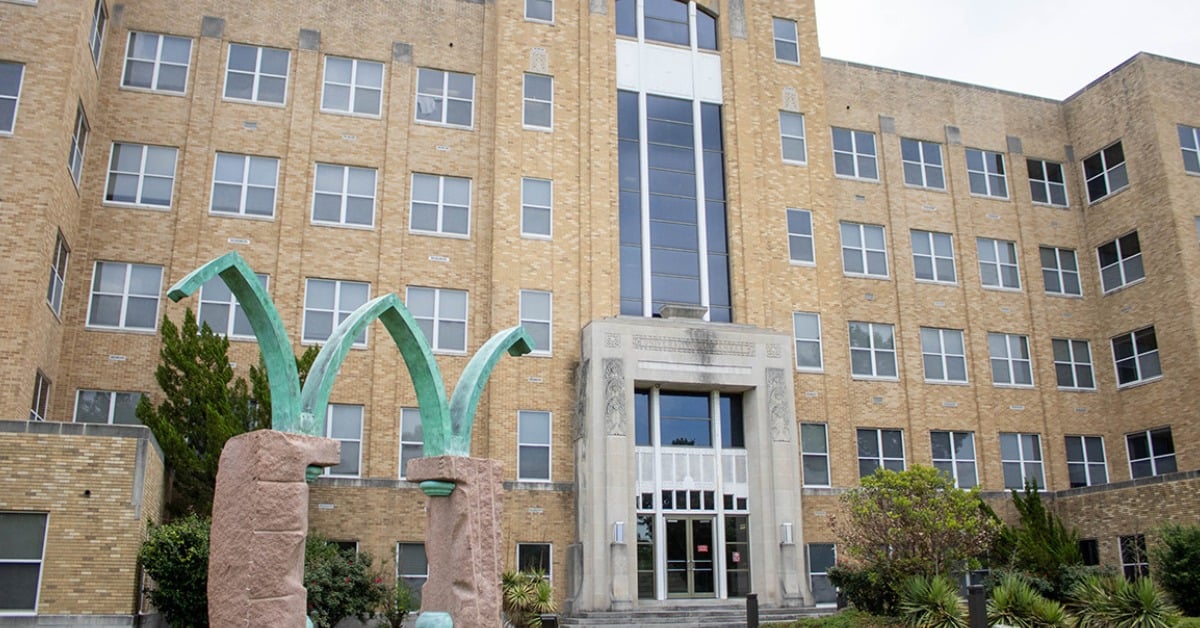
The University of Arkansas at Little Rock William H. Bowen School of Law (Bowen) is a public, ABA-accredited institution in Little Rock, Arkansas. Bowen, known for its value and affordability, enables students to pursue a high-quality legal education while minimizing debt. The law school offers affordable tuition rates, especially for Arkansas residents, who pay approximately $16,728 annually, while non-residents pay $32,671. Competitive tuition rates position Bowen as one of the least expensive law schools in the country, contributing to its ranking among schools with minimal graduate debt.
University of Arkansas Law School ranking places Bowen at No. 143 in the U.S. News & World Report, while preLaw Magazine frequently lists it as a “Best Value Law School.” Affordable tuition and strong employment outcomes reinforce Bowen’s reputation as a cost-effective option for students seeking quality education. Bowen holds full accreditation from the American Bar Association, qualifying graduates to sit for the Bar exam in any U.S. jurisdiction. ABA accreditation ensures the institution meets national standards for legal education, supporting students’ professional readiness.
Bowen, founded in 1975, is part of the University of Arkansas System and holds a longstanding presence in Arkansas. The law school emphasizes public service and accessible legal education, fostering a strong commitment to community impact and service as one of only two public law schools in the state. Bowen provides students access to state courts, government offices, and legal institutions in Little Rock, Arkansas’s capital city. The school’s proximity to key legal entities offers valuable internship and networking opportunities within Arkansas’s legal, business, and government sectors.
The University of Arkansas law school acceptance rate is approximately 59%, reflecting moderate selectivity compared to other U.S. law schools. Bowen’s accessible admissions emphasize the school’s commitment to providing legal education opportunities, especially for students within Arkansas and nearby regions. The law school’s median LSAT score for admitted students is around 152, with the middle 50% range spanning from 149 to 155. A moderate LSAT score range supports the school’s mission of accessibility while maintaining academic standards. The median GPA for students at Bowen is approximately 3.39, with most GPAs falling between 3.15 and 3.68. Bowen’s GPA requirements reflect the institution’s dedication to accommodating students with strong academic potential and diverse backgrounds. Bowen requires applicants to submit a comprehensive application, including a personal statement, resume, letters of recommendation, and LSAT or GRE scores. Strong extracurricular involvement and community engagement enhance applications and align with Bowen’s emphasis on well-rounded candidates. Bowen Law graduates achieve a Bar passage rate of about 75.4%, closely matching the state average. The rate reflects the school’s effective academic preparation and commitment to supporting students’ success in Bar exams and professional practice.
The law school offers a Juris Doctor (JD) program with full-time and part-time enrollment options. Bowen, the only law school in Arkansas with a flexible part-time evening program, accommodates working professionals seeking legal education. University of Arkansas-Little Rock (Bowen) provides clinical opportunities and specializations in Family Law, Business Innovation, Mediation, and Veterans Legal Services. Public service-oriented programs and externships with local government and nonprofit organizations further align with Bowen’s mission-driven approach. Bowen’s in-state tuition is approximately $16,728 for the 2023-2024 academic year, while out-of-state students pay around $32,671. The law school supports affordability, with 66% of students receiving financial aid averaging $6,676 annually, making it one of the most affordable law schools in its region.
4. University Of Montana (Blewett)
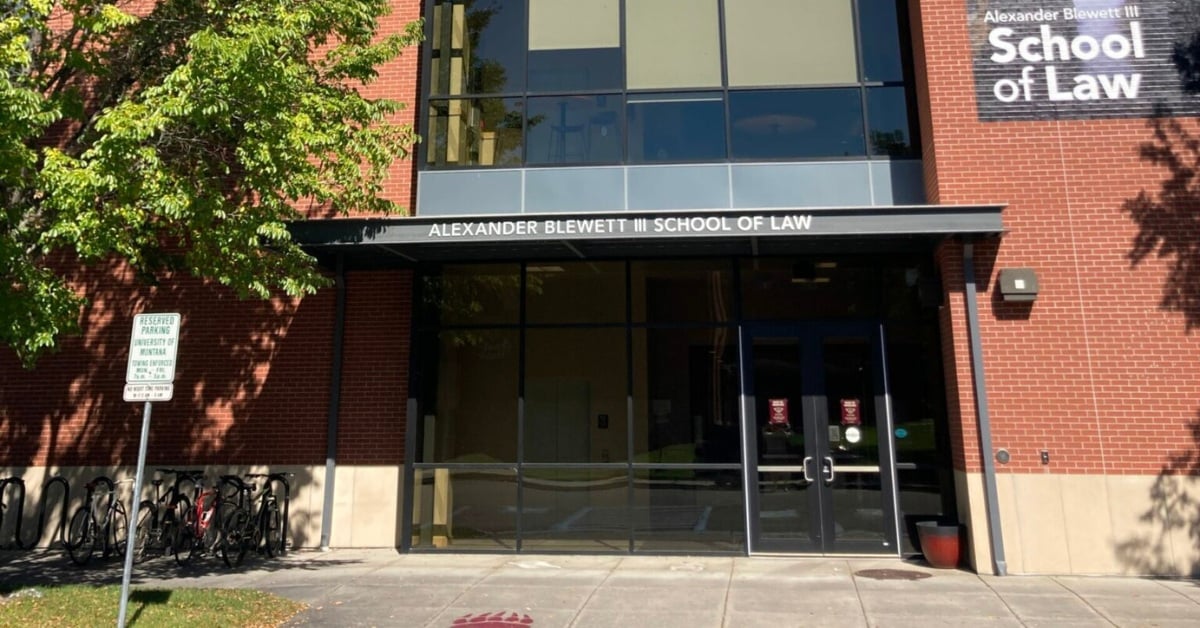
The Alexander Blewett III School of Law at the University of Montana in Missoula offers ABA-accredited legal education. Blewett, recognized for affordable tuition and practical training, is an ideal choice for public service, environmental law, and natural resources law students. The school’s focus on experiential learning sets it apart in legal education. The Alexander Blewett III School of Law charges around $22,060 annually for Montana residents, while non-residents pay about $47,794. Affordable tuition rates make Blewett accessible for in-state and out-of-state students seeking cost-effective, ABA-accredited legal education. Students graduate with comparatively low debt, benefiting from quality education and practical training at an affordable rate.
University of Montana (Blewett) ranks No. 103 among law schools in the U.S., known for affordability and strong employment outcomes. Blewett, nationally recognized in environmental law, is ideal for students interested in the field. The law school’s ranking reflects strong career readiness, appealing to individuals seeking high-value and quality legal education. The Alexander Blewett III School of Law holds full accreditation from the American Bar Association, qualifying graduates for Bar exam eligibility nationwide. ABA accreditation ensures Blewett adheres to national educational standards, allowing graduates to practice across U.S. jurisdictions. Recognition by the ABA affirms Blewett’s high-quality curriculum and focus on student success.
Blewett School of Law, founded in 1911, has a long-standing commitment to public service and practical training. The school was renamed in 2015 after attorney Alexander Blewett III honoring his contributions. The school’s history reflects a dedication to quality, community-centered legal education, attracting students committed to service-oriented careers. Blewett students in Missoula, Montana, benefit from a supportive legal community and abundant outdoor recreation opportunities. Missoula’s natural setting complements the school’s focus on environmental law, providing a fitting context for hands-on learning.
The Alexander Blewett III School of Law acceptance rate is approximately 71%, making it moderately selective among U.S. law schools. The acceptance rate reflects Blewett’s commitment to accessibility, admitting students with varied academic backgrounds and individuals interested in public service and enhancing diversity within the legal field. The median LSAT score for incoming students at Blewett Law is around 154, with scores ranging from 151 to 158. The range reflects the school’s academic standards, supporting an accessible yet competitive admission process aimed at attracting capable future law professionals. The median GPA for admitted students at Blewett Law stands at 3.48, ranging from 3.05 to 3.71. The GPA requirements highlight Blewett’s selective standards while inviting students with strong academic performance to contribute to its educational environment. Applicants must complete an application through LSAC, including a personal statement, resume, and letters of recommendation. University of Montana (Blewett) values candidates with backgrounds in public service and demonstrated leadership, supporting its mission of community-centered, service-oriented legal education. Blewett Law’s Bar passage rate for graduates is about 84.8%, surpassing the Montana state average. The strong passage rate underscores the school’s commitment to preparing students effectively for Bar exams and ensuring their readiness for legal careers.
The University of Montana (Blewett) offers a Juris Doctor (JD) degree and joint options such as the JD/MBA and JD/Environmental Science. The programs allow students to merge legal training with business or environmental fields, supporting diverse career goals. Blewett Law specializes in environmental and natural resources law and Indian law. Clinical programs and field placements provide students with practical experience, preparing them for real-world issues in specialized areas. Blewett’s in-state tuition is approximately $22,060 annually, while out-of-state students pay around $47,794. The competitive tuition rates and financial aid make Blewett an affordable choice for students seeking value-driven legal education.
5. Georgia State University
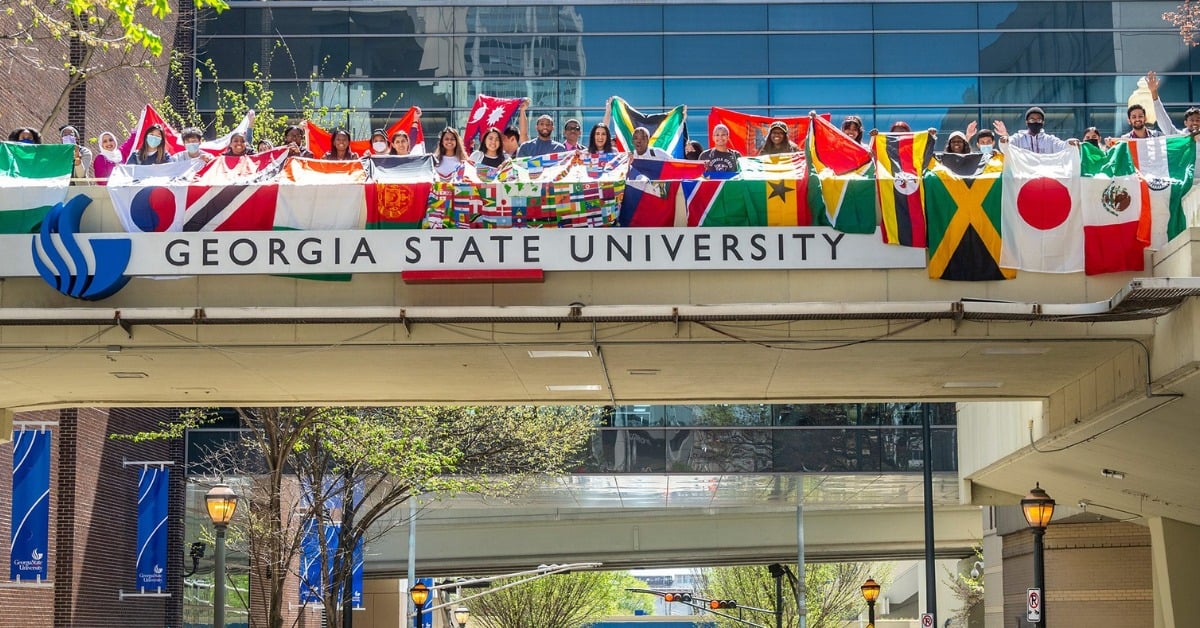
Georgia State University College of Law, located in Atlanta, is an ABA-accredited public institution known for its affordability and practical training. The college’s commitment to accessible legal education supports students pursuing law careers with minimal debt, making it a top-value choice. Georgia State Law’s tuition for in-state students is approximately $17,596 annually, making it highly affordable. Out-of-state students pay about $37,144. Georgia State’s focus on reducing student debt aligns with its mission, making it one of the most budget-friendly ABA-accredited law schools nationwide.
The Georgia State University law school ranking is No. 75 nationally, underscoring its well-rounded legal education offerings. Georgia State Law’s Health Law program ranks No. 1 nationwide, complemented by strong programs in part-time law and intellectual property. The rankings highlight the school’s emphasis on specialized, high-quality education. Georgia State University College of Law is fully accredited by the American Bar Association, qualifying graduates to practice law nationwide. ABA accreditation ensures that Georgia State Law adheres to high standards, supporting students’ eligibility for Bar exams across U.S. jurisdictions.
Georgia State University College of Law, founded in 1982, was created to offer affordable, practice-oriented legal education. The school’s founding aligns with Georgia’s commitment to producing qualified legal professionals serving public service and private practice sectors. Georgia State Law students in downtown Atlanta benefit from access to prominent law firms, government agencies, and nonprofits. Atlanta’s diverse legal and business communities provide valuable externship and networking opportunities, enhancing practical training and career preparation.
The acceptance rate at Georgia State University College of Law is around 31%, reflecting moderate selectivity in admissions. The school values a balanced approach, assessing applicants’ academic records and unique backgrounds to create a diverse, accomplished student body. The median LSAT score for full-time students at Georgia State Law is approximately 159, ranging between 157 and 162. Part-time students’ LSAT scores generally fall between 153 and 159, aligning with the school’s emphasis on accessible yet rigorous admission standards. The median GPA for admitted students at Georgia State Law is about 3.56, with most students between 3.35 and 3.77. The GPA requirement supports the school’s commitment to admitting academically strong students prepared for Georgia State’s rigorous curriculum. Applicants must provide transcripts, LSAT scores, a personal statement, letters of recommendation, and a resume. Georgia State Law does not accept GRE scores, underscoring the importance of the LSAT in its admissions process, which evaluates academic potential and character. Georgia State Law has a Bar exam passage rate of approximately 79% for first-time takers, close to the state average. The rate demonstrates the school’s commitment to preparing students thoroughly for the Bar exam and legal careers.
Georgia State Law offers a Juris Doctor (JD) degree in full-time and part-time formats. Dual-degree programs such as the JD/MBA and JD/MPH provide interdisciplinary learning, combining law studies with fields like business and public health. Georgia State Law specializes in areas like Health Law, Intellectual Property, and Environmental and Land Use Law. The programs include clinics and externships that offer practical experience, particularly beneficial within Atlanta’s vibrant legal and business market. Georgia State Law’s in-state tuition is about $17,596 per year, while out-of-state students pay around $37,144. Financial aid options are available, with 61% of students receiving grants averaging $9,804, reinforcing Georgia State’s reputation as an affordable law school option.
How To Choose Which Cheap Law School To Apply For?
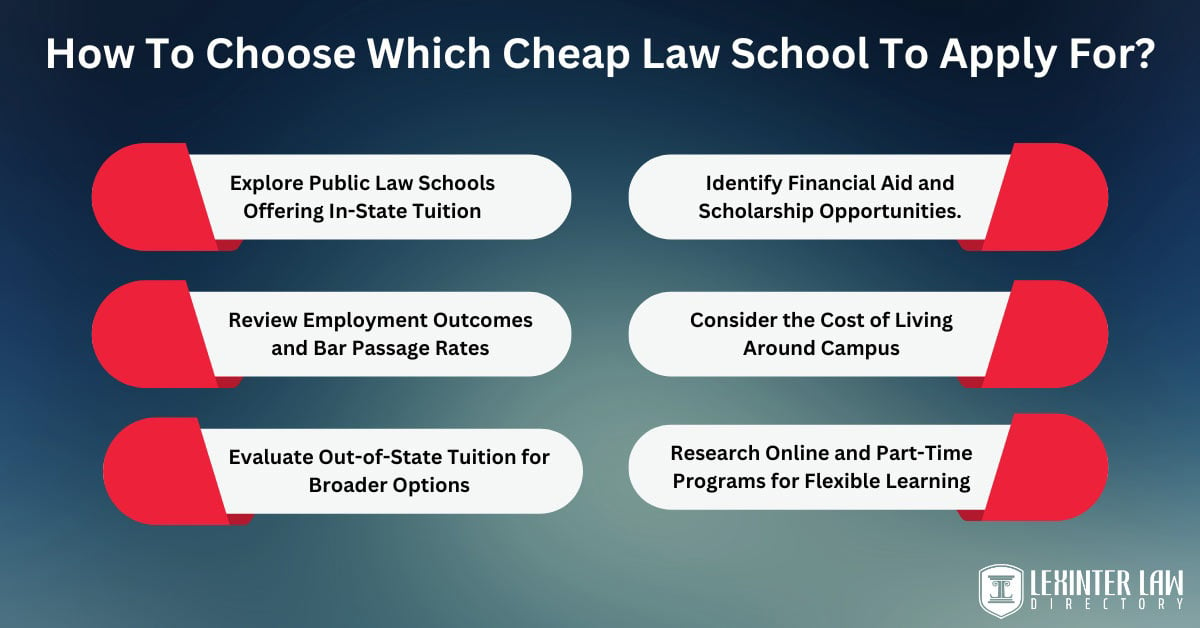
To choose which cheap law school to apply for, follow the 6 steps listed below.
- Explore Public Law Schools Offering In-State Tuition. Several public law schools offer lower tuition for residents. Research each school’s residency requirements to qualify for in-state tuition potentially. Several schools allow out-of-state students to qualify after a specific period, which reduces total education costs. Investigate each school’s policy on in-state tuition for prospective cost savings.
- Identify Financial Aid and Scholarship Opportunities. Affordable law schools have generous financial aid programs or scholarships. Look for schools with strong endowments or financial aid dedicated to students with academic or financial need. Programs offering full-ride scholarships provide substantial financial relief, allowing for high-quality education with minimal debt burden. Investigate each school’s scholarship or financial aid offerings early in the application process.
- Review Employment Outcomes and Bar Passage Rates. Law schools with affordable tuition prioritize job placement and Bar passage. Investigate each school’s employment rates and support for securing post-graduation positions. High Bar passage rates signal quality preparation, making affordable schools valuable investments. Schools with strong alumni networks and career support services enhance job prospects, balancing low tuition costs with career success.
- Consider the Cost of Living Around Campus. Total costs include tuition and the cost of living in the school’s area. Research locations with lower living costs, such as rural or small-city campuses. Affordable living expenses, coupled with reasonable tuition, greatly reduce financial burden. Factor in housing, transportation, and daily expenses to fully understand each school’s financial requirements.
- Evaluate Out-of-State Tuition for Broader Options. A comparison of out-of-state tuition costs is necessary when considering schools outside the home state. Several law schools offer nearly equal in- and out-of-state tuition, allowing flexibility without large cost increases. Regional reciprocity programs, where states offer reduced rates for neighboring residents, improve affordability. Look for the programs if one’s desired school is out-of-state.
- Research Online and Part-Time Programs for Flexible Learning. Several law schools offer online or part-time programs, allowing students to study while working. Flexible programs provide savings on tuition and permit earning an income, reducing financial strain. Online programs eliminate relocation costs, making education accessible regardless of location. Evaluate program quality and accreditation to ensure an affordable, valuable law degree.
What Are The Requirements For Applying To Law School?
The requirements for applying to law school encompass essential academic credentials and supporting documents that provide admissions committees with a comprehensive profile of each candidate. Applicants must hold a Bachelor’s degree from an accredited institution, though specific majors are not mandated. Common fields like political science, economics, and history are helpful as they foster analytical and writing skills that are critical for law studies. Law schools require LSAT scores, with some accepting the GRE as an alternative. LSAT scores, ranging from 120 to 180, measure reading comprehension, logical reasoning, and analytical skills, and competitive programs look for scores above 160. Transcripts are submitted through the Credential Assembly Service (CAS) provided by LSAC, which compiles GPA and necessary documents into a standardized report for law schools.
Additional materials such as personal statements, letters of recommendation, and resumes offer insight into an applicant’s character, abilities, and experiences beyond grades and test scores. The requirements for applying in law school include personal statements, which allow candidates to showcase motivations and strengths, providing a cohesive narrative about their commitment to a legal career. Recommendation letters from professors or professional supervisors give insights into work ethic, academic abilities, and leadership potential. A resume summarizes education, work experience, and relevant skills, while non-native English speakers must provide TOEFL or IELTS scores to meet language requirements. The requirements ensure that law schools assess each applicant’s readiness and fit for the demands of legal education.
Do All Law Schools Have The Exact Requirements?
No, not all law schools have the exact requirements. Each law school applies specific criteria tailored to its mission, student focus, and academic emphasis. The majority of American Bar Association (ABA)-accredited law schools mandate core elements like a Bachelor’s degree, LSAT or GRE scores, letters of recommendation, and a personal statement. Each institution tailors the components, offering distinct pathways within the common framework. The LSAT remains the primary standardized test; however, numerous schools, including Harvard Law School and Georgetown University Law Center, now accept the GRE, broadening accessibility and appealing to a more diverse applicant pool. The flexibility emphasized after the COVID-19 pandemic reflects each law school’s aim to attract students with varied strengths. Law schools differ significantly in their benchmarks for GPA and test scores. The highly ranked institutions, including Harvard and Yale, expect competitive LSAT scores in the 170s and top GPAs, while other schools consider students with scores ranging from 140 to 150. Schools balancing lower test scores focus more on work experience, volunteer efforts, or other personal accomplishments. Varying criteria, such as unique personal statement prompts or experiential learning requirements, contribute to distinct admission standards reflecting each school’s focus, competitive nature, and commitment to applicant diversity.
What Is The Average GPA For Law Schools?
The average GPA for law school admission is around 3.55, though the GPA varies based on each school’s ranking and selectivity. The highly competitive institutions, such as Yale, Stanford, and Harvard, have median GPAs exceeding 3.9, setting rigorous academic standards. Yale Law’s median GPA stands at 3.94, with Stanford and Harvard close behind at 3.91 and 3.90, respectively. The numbers reflect the intensity of competition among top-tier law schools and their demand for academic excellence. Affordable law schools and mid-tier institutions have more accessible average GPA expectations than top-tier programs. Schools like the University of the District of Columbia David A. Clarke School of Law (UDC Law) maintain a median GPA of 3.27, prioritizing affordability and inclusivity. The University of Arkansas at Little Rock has a median GPA of 3.39, attracting candidates with strong academic records while offering lower tuition rates than most private schools.
What Is The Average LSAT Score To Get Into A Cheap Law School?
The average LSAT score to get into a cheap law school ranges from 145 to 152. Several cost-effective law schools accept lower LSAT scores compared to higher-ranked institutions, focusing on accessibility and affordability. Institutions like the University of the District of Columbia and Bowen School of Law admit students with median LSAT scores around 146 to 150. The schools offer an option for students who do not reach the national median LSAT score of 151 to 152 but still seek a quality legal education within a budget-friendly framework.
Applying to a law school without an LSAT score has become an option at some affordable institutions, with many now accepting GRE scores instead. Law schools expand opportunities for students who excel academically but do not perform as well on standardized tests by offering alternatives to the LSAT. Several public law schools, especially affordable ones, allow GRE scores in place of the LSAT. The option makes legal education accessible to a broader range of applicants, especially for individuals pursuing part-time or online law programs. Schools prioritizing affordability and flexible admissions options, such as the University of the District of Columbia, have adopted policies to balance educational access with quality training. The average LSAT score and GRE flexibility thus provide a realistic path for many aspiring law students seeking affordable options.
What Are The Benefits Of Getting Into A Cheap Law School?

The 6 benefits of getting into a cheap law school are listed below.
- Lower Debt: Affordable law schools significantly reduce students’ debt, allowing greater financial flexibility after graduation. Graduates from the institutions avoid overwhelming student loans, enabling them to consider various career paths. Lower debt burdens allow graduates to pursue roles in public interest, government, or nonprofit sectors without heavy financial constraints.
- Accessible Career Options: Affordable law schools open doors to diverse career opportunities in various fields, including public service and nonprofit roles. Several school graduates commit to positions in underrepresented or underserved communities. Reduced financial strain allows one to prioritize passion over salary, making careers in public defense, advocacy, or policy work financially manageable.
- Geographic Employment Advantages: Law schools with affordable tuition hold strong reputations within their specific regions, enhancing local job prospects. Employers within the areas value graduates from regional institutions, viewing them as deeply connected to the local legal landscape. Affordable regional law schools give graduates a competitive edge within nearby legal markets, increasing chances for stable employment close to their alma mater.
- Cost-effective Education: Affordable law schools deliver essential legal education at a fraction of the cost compared to higher-priced institutions. Graduates receive training on foundational legal skills necessary for various legal careers without paying premium tuition. Several affordable schools offer specialized courses related to regional or specific fields of law, making their legal education practical and cost-effective for students.
- Higher Return on Investment: Graduates from affordable law schools achieve a higher return on investment due to manageable tuition expenses. Lower student debt allows graduates to maintain a balanced lifestyle even in moderate-paying positions. The financial advantage makes affordable law schools attractive options for students seeking rewarding careers that do not offer top salaries but provide personal satisfaction.
- Opportunity to Build Niche Expertise: Several affordable law schools emphasize specialized fields like regional law, public service, or community-focused legal work, attracting students interested in niche careers. The programs encourage the development of unique skills tailored to specific fields, allowing graduates to build in-demand expertise. A focus on niche expertise provides graduates with distinctive career opportunities and an edge in specialized legal markets.
What Are The Downsides Of Getting Into A Cheap Law School?
The 6 downsides of getting into a cheap law school are listed below.
- Limited Prestige and Perception: Lower-cost law schools lack the prestige of top-ranked institutions, impacting graduates’ competitiveness in job markets. Several employers, particularly large or competitive firms, favor graduates from well-known, elite law schools. Graduates from cheaper schools face additional challenges in building credibility, especially when pursuing roles where institutional prestige carries significant weight.
- Weaker Alumni Network: Several low-cost law schools lack a strong alumni network, limiting students’ access to professional mentorship and referrals. The absence of a robust network makes it difficult for graduates to connect with established professionals in the field. Building meaningful relationships for career advancement is challenging, especially compared to alumni from prestigious institutions with more active and influential networks.
- Lower Bar Passage Rates: Budget-friendly law schools have lower Bar exam passage rates due to limited educational resources or student preparedness. Graduates face a greater challenge securing licensure in competitive regions, impacting their entry into the legal profession. Passing the Bar exam is essential for practicing law, and graduates from schools with lower rates face additional preparation hurdles.
- Reduced Faculty Resources: Cheaper law schools struggle to attract experienced faculty members due to financial constraints, impacting course quality. Several students miss out on specialized courses and clinical learning opportunities crucial for practical legal training. Access to knowledgeable faculty and diverse course offerings significantly shape law students’ professional preparation, which is limited at lower-cost institutions.
- Career Options Limited to Certain Regions: Several inexpensive law schools have a regional focus, limiting graduates’ mobility to other national markets. Regional employers value graduates from the schools, but relocating to other competitive areas is challenging. Law students aiming for careers in larger legal markets or specific regions outside their school’s locality find that limitations restrict their employment options.
- Increased Competition Within School: Cheap law schools experience intense competition among students for top grades and internship placements due to limited resources. Securing career-entry opportunities feels more challenging, adding to students’ stress levels during their legal studies. Limited internship options and a smaller job market mean students face a competitive atmosphere within their academic environment.
What Law School Has The Lowest Fees?
The University of the District of Columbia David A. Clarke School of Law (UDC Law) has the lowest fees. The law school’s tuition rates are significantly below the national average among ABA-accredited law schools. UDC Law offers an annual tuition of $13,438 for D.C. residents and $25,874 for non-residents. The low-cost structure aligns with UDC Law’s mission to make legal education accessible, especially for students interested in public service or fields that offer lower earning potential. UDC Law reduces financial barriers to support students aiming to make a difference in their communities. UDC Law further strengthens its affordability through robust financial aid and scholarship programs that help reduce student debt. Emphasizing practical, community-based training, UDC Law integrates extensive clinical programs where students gain hands-on experience in areas like immigration, civil rights, and public interest law. The focus on affordability, practical training, and public service makes UDC Law attractive for students seeking an accessible, impactful, and debt-conscious legal education.
Do The Cheap Law Schools Have A Low Passing Rate?
Yes, many cheap law schools have low passing rates compared to more expensive, prestigious institutions. The trend largely reflects disparities in resources, academic support, and admissions standards. Schools like the University of the District of Columbia David A. Clarke School of Law report Bar passage rates between 40-50%, which fall below the ABA’s 75% requirement for maintaining accreditation. Factors contributing to lower passage rates at such institutions include less selective admissions and limited resources for comprehensive Bar preparation, challenging students’ ability to pass the exam. Affordable schools like Brigham Young University School of Law, however, maintain high Bar passage rates above 90% despite relatively low tuition. The example suggests that affordability does not inherently result in low Bar passage rates but that such issues appear more common among lesser-funded institutions. Resource availability, targeted Bar prep programs, and student academic support are critical in supporting student success on the Bar exam, and the resources differ significantly across institutions.
What Are The Most Expensive Law Schools To Get Into?
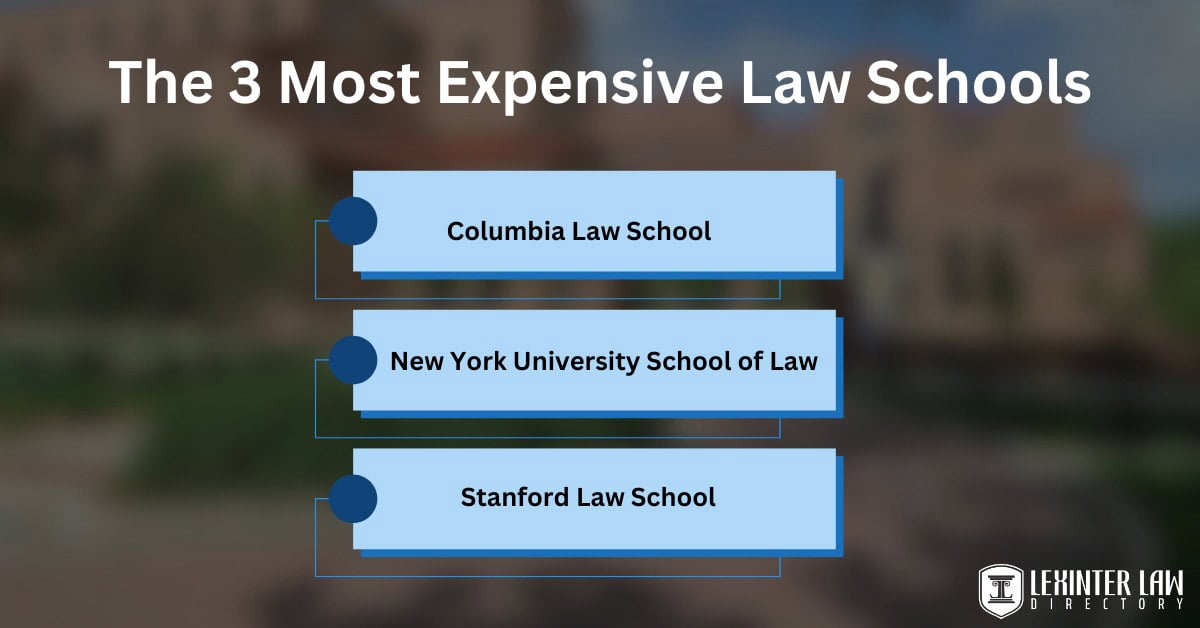
The 3 most expensive law schools to get into are listed below.
- Columbia Law School: Columbia Law School in New York City is the most expensive law school in the United States, with an annual tuition of $81,292. The total yearly cost exceeds $110,000, including additional expenses. Columbia offers top-tier resources, faculty, and career placements known for strengths in corporate, international, and constitutional law. Several students choose Columbia for its reputation and career advantages, with graduates frequently entering prestigious roles in leading law firms, government positions, or academia, making the high cost justifiable for many.
- New York University School of Law: New York University School of Law ranks among the most expensive law schools to get into, with tuition of around $80,014 per year. Total costs, including living expenses, reach approximately $130,000 annually. NYU Law offers a prime location and notable strengths in international law, environmental law, and public interest law situated in Manhattan. The rigorous academics and extensive alumni network attract students aiming for careers in top law firms or influential public sector roles, supported by robust job placement services.
- Stanford Law School: Stanford Law School in Silicon Valley, California, charges an annual tuition of around $73,713, bringing total expenses to over $107,000 per year. Stanford is recognized for its unique focus on technology, innovation, and entrepreneurship, catering to students interested in legal roles within the tech and corporate sectors. The small student-to-faculty ratio and highly collaborative academic environment, paired with strong employment outcomes, draw students who seek to make an impact in cutting-edge legal fields. Stanford’s high cost aligns with its reputation and specialized opportunities in tech law.

